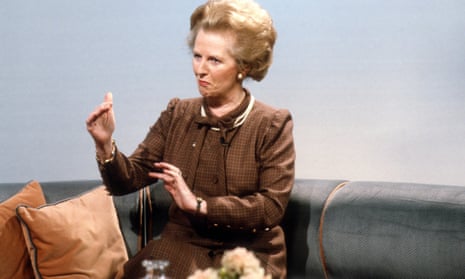Margaret Thatcher has been added to the Oxford Dictionary of National Biography, commanding more space in the venerable reference work than any other Briton apart from Shakespeare and Elizabeth I. Eclipsing records for Queen Victoria, Winston Churchill and Henry VIII, historian David Cannadine’s biography of Britain’s first female PM is the third longest of the 60,000-plus entries in the 72m-word work.
Thatcher’s listing details her rise to power, from Lincolnshire grocer’s daughter to global political force during the cold war. Cannadine is robust in his 30,000-word assessment of Thatcher’s career, noting that as well as being one of the few politicians to lend their name to a political doctrine – Thatcherism – her blunt approach to leadership led to ferocious clashes from the miners’ strike to the poll tax riots. Her front and backbenchers in parliament knew a leader who it was punishing to cross.
Cannadine, who is the ODNB’s general editor, concludes his assessment: “There are times when nations may need rough treatment. For good and for ill, Thatcher gave Britain plenty of it.”
As with the other 214 lives recorded in the latest additions to the ODNB, Thatcher died in 2013. Entries are always posthumous and feature persons of note from Roman Britain to the 21st century. Editors wait four years after the death of a notable figure to assess whether they are worthy of a place in what is effectively the canon of British public life, whose first edition was in 1885.
Among other new entries to the ODNM, which is available free online through public libraries, are six Nobel laureates. As well as the poet Seamus Heaney and novelist Doris Lessing, they are chemists Frederick Sanger and Sir John Cornforth, economist Ronald Coase and Robert Edwards, who received the honour in 2010 for pioneering work on in vitro fertilisation.
Among notables from the arts and entertainment world to have found their place in the dictionary are writers Tom Sharpe and Iain Banks, TV personalities David Frost, Alan Whicker and Good Life star Richard Briers. Comedians Mike and Bernie Winters and writer Eddie Braben, famous for writing the scripts for Morecambe and Wise.
Notoriety, as well as repute, can be qualification for inclusion in the dictionary. Two of the Great Train Robbers have been added. Though Ronnie Biggs played only a minor role in the 1963 robbery, his name has been added because his subsequent escape to Brazil as a fugitive from justice turned him into a “money-making celebrity”. His partner in crime Bruce Reynolds, who was the mastermind of the heist, has also been added to the collected lives.
The dictionary moved online in 2004 and has since become available to library users throughout the UK. Published by the Oxford University Press, it is a research tool for Oxford University and makes no commercial return on the £25m investment in its creation.

Comments (…)
Sign in or create your Guardian account to join the discussion